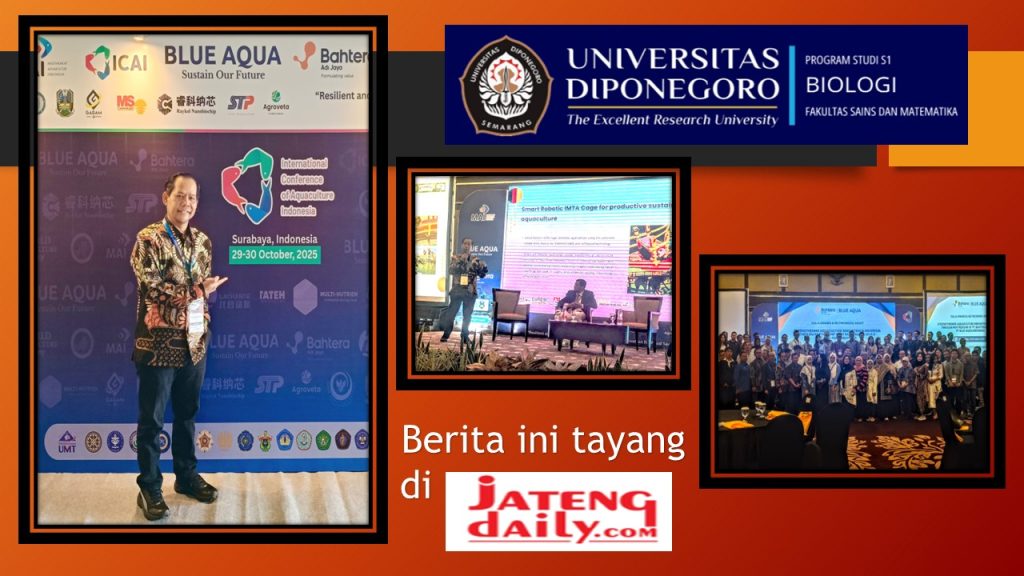Prof. Drs. Sapto P. Putro, M.Si., Ph.D., Head of the Department of Biology at the Faculty of Science and Mathematics (FSM), Diponegoro University, and Director of the Center of Marine Ecology and Biomonitoring for Sustainable Aquaculture (Ce-MEBSA), served as one of the keynote speakers at The 11th International Conference of Aquaculture Indonesia (ICAI) 2025. The conference was held over two days, Wednesday–Thursday (29–30 October 2025), in Surabaya.
Organized by the Indonesian Aquaculture Society (MAI), ICAI 2025 once again became a collaborative forum for practitioners, academics, researchers, and policymakers from Indonesia and abroad. This year’s event focused on the theme “Resilient and Sustainable Aquaculture: Advancing Innovation for Food Security and Blue Economy.”
During his session, Prof. Sapto delivered a presentation titled “Smart Robotic IMTA Combined with Dashboard System and Smart Biomonitoring for Productive Sustainable Mariculture.” He emphasized that as the world’s largest archipelagic nation—with approximately 5.8 million km² of marine area and over 95,000 km of coastline—Indonesia possesses tremendous potential to advance sustainable aquaculture development.
He explained that the growing global demand for safe, high-quality, and environmentally responsible seafood requires breakthroughs in cultivation technology. Rising global fish consumption and increasing awareness of healthy food choices make innovation in aquaculture an urgent need. In this context, modernization and automation are essential to support efficiency, traceability, and sustainability while aligning with the principles of the blue economy.
One of Ce-MEBSA Undip’s key innovations is the Smart Robotic Integrated Multi-Trophic Aquaculture (IMTA) Cage, a KJABB-IMTA system that has been patented (Patent No. IDS000001488). This technology integrates marine ecology, robotics, informatics, and renewable energy into a smart, IoT-based platform.
The system features real-time monitoring of water quality and weather conditions, automated feeding and cage management, robotic security surveillance around the mariculture installation, solar-powered energy systems, underwater monitoring, computer vision–based detection of fish population and size, and environmental disturbance monitoring through the EWS-2SJ smart biomonitoring application. These integrated components aim to support productive, efficient, and sustainable mariculture practices.
Prof. Sapto believes that the Smart Robotic IMTA Cage can serve as a replicable model to accelerate the transformation of marine aquaculture in Indonesia toward a smarter, more adaptive, and globally competitive future—while contributing to the achievement of the SDGs and strengthening national blue economy initiatives.
ICAI 2025 was attended by several notable figures, including East Java Vice Governor Dr. Emil Elestianto Dardak, M.Sc.; Deputy Minister of Marine Affairs and Fisheries Laksdya TNI (Purn.) Dr. Didit Herdiawan, MPA., MBA; and President of MAI Prof. Dr. Rokhim Dahuri, along with numerous experts and academics from national and international institutions.
This article is published on https://jatengdaily.com

